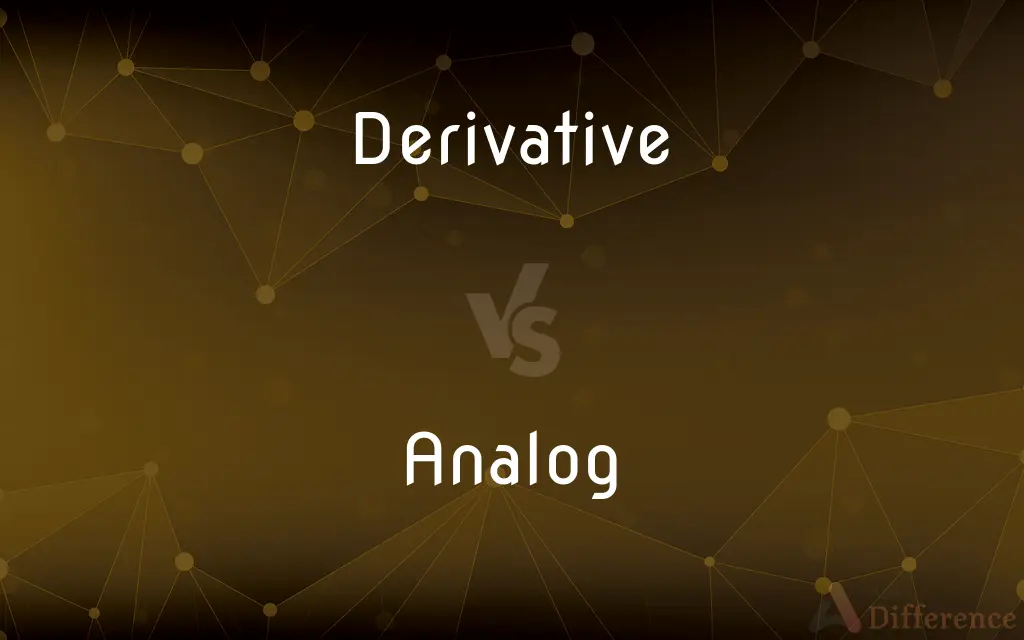Derivative vs. Analog — What's the Difference?
Edited by Tayyaba Rehman — By Fiza Rafique — Updated on March 18, 2024
A derivative is a financial instrument whose value is based on an underlying asset, whereas an analog refers to a continuous signal or a device representing data by continuous variables.

Difference Between Derivative and Analog
Table of Contents
ADVERTISEMENT
Key Differences
Derivatives are financial contracts whose value is derived from the performance of an underlying asset, index, or interest rate. On the other hand, analog pertains to a form of signal or data representation where information is conveyed through continuous variations of physical quantities.
While derivatives are financial mechanisms for managing risk and speculation, analog signals are foundational to various forms of communication and technology, reflecting a fundamental difference in application and concept. Derivatives function within the realm of financial markets, leveraging mathematical models and market strategies. Analog, however, is grounded in physical and engineering principles, emphasizing the natural and continuous representation of information.
The calculation and analysis of derivatives rely on complex financial theories and models to predict the future price movements of the underlying asset and to navigate the risks associated with market changes. In contrast, the creation, manipulation, and interpretation of analog signals focus on capturing, reproducing, and transmitting real-world phenomena through continuous means, often requiring different types of engineering knowledge and technology.
Despite their distinct fields of application, both derivatives and analog systems require a deep understanding of their respective principles to effectively manage risks in financial markets or to accurately capture and reproduce real-world signals. The former is essential in the financial industry for investment, hedging, and speculative strategies, while the latter plays a crucial role in electronics, communication, and various forms of analog technologies.
Comparison Chart
Definition
Financial instrument based on an underlying asset.
Signal or device representing data by continuous variations.
ADVERTISEMENT
Primary Use
Hedging, speculation, arbitrage.
Representation and transmission of information.
Examples
Futures, options, swaps.
Analog clocks, audio recordings.
Underlying Principle
Financial markets and risk management.
Physical and engineering principles of continuous signal processing.
Application Area
Finance and investment.
Technology, communication, audio.
Representation
Based on asset price movements and contracts.
Based on continuous physical quantities.
Analysis and Calculation
Requires financial models and theories.
Focuses on capturing and processing real-world phenomena.
Key Concerns
Risk management, market speculation.
Accuracy in representation and transmission.
Nature
Abstract financial concept.
Physical and often tangible in nature.
Compare with Definitions
Derivative
Central to modern financial strategies.
Derivatives play a key role in the financial strategies of investment funds.
Analog
Essential in audio and visual applications.
Professional musicians often prefer analog synthesizers for their warm sound.
Derivative
A contract whose value is derived from the performance of an underlying entity.
He traded options, a type of derivative, to capitalize on stock market movements.
Analog
Signal representation through continuous variations.
Vinyl records store music as analog signals in their grooves.
Derivative
Markets can be highly volatile.
Derivative markets can see significant price swings, affecting profitability.
Analog
Faces limitations in the digital age.
Analog signals are susceptible to noise, unlike their digital counterparts.
Derivative
Used for risk management and speculation.
Companies use currency futures, derivatives, to hedge against foreign exchange risk.
Analog
Characterized by its natural, continuous form.
Analog thermometers use mercury expansion to measure temperature.
Derivative
Involves complex valuation methods.
The valuation of derivatives like swaps depends on intricate financial models.
Analog
Used in various forms of technology.
Analog watches use continuously moving hands to display time.
Derivative
In mathematics, the derivative of a function of a real variable measures the sensitivity to change of the function value (output value) with respect to a change in its argument (input value). Derivatives are a fundamental tool of calculus.
Analog
Something that bears an analogy to something else; something that is comparable
“Titan, Saturn's giant moon … seems like an analog of the environment of Earth on the eve of life” (David Grindspoon).
Derivative
Resulting from or employing derivation
A derivative word.
A derivative process.
Analog
(Biology) An organ or structure that is similar in function to one in another kind of organism but is of dissimilar evolutionary origin.
Derivative
Copied or adapted from others
A highly derivative prose style.
Analog
(Chemistry) A structural derivative of a parent compound that often differs from it by a single element.
Derivative
Something derived.
Analog
Of, relating to, or being a device in which data or a signal is represented by continuously variable, measurable, physical quantities, such as length, width, voltage, or pressure.
Derivative
(Linguistics) A word formed from another by derivation, such as electricity from electric.
Analog
Done, happening, or existing in the physical world rather than on an electronic device
Analog strategy games.
Analog friendships.
Derivative
The limiting value of the ratio of the change in a function to the corresponding change in its independent variable.
Analog
(of a device or system) In which the value of a data item (such as time) is represented by a continuous(ly) variable physical quantity that can be measured (such as the shadow of a sundial).
An analog watch
Derivative
The instantaneous rate of change of a function with respect to its variable.
Analog
Not relating to, or pre-dating, digital technology such as computers and the Internet; relating to real life.
An analog (paper) map
Derivative
The slope of the tangent line to the graph of a function at a given point. Also called differential coefficient, fluxion.
Analog
(countable) Something that bears an analogy to something else.
Derivative
(Chemistry) A compound derived or obtained from another and containing essential elements of the parent substance.
Analog
An organ or structure that is similar in function to one in another kind of organism but is of dissimilar evolutionary origin.
Derivative
A financial instrument that derives its value from another more fundamental asset, as a commitment to buy a bond for a certain sum on a certain date.
Analog
(chemistry) A structural derivative of a parent compound that differs from it by only one or a few atoms or substituent groups; (usually, especially) such a molecule that retains most of the same chemical properties.
Insulin analogue
Derivative
Obtained by derivation; not radical, original, or fundamental.
A derivative conveyance
A derivative word
Analog
Something having the property of being analogous to something else
Derivative
Imitative of the work of someone else.
Analog
Of a circuit or device having an output that is proportional to the input;
Analogue device
Linear amplifier
Derivative
Referring to a work, such as a translation or adaptation, based on another work that may be subject to copyright restrictions.
Derivative
(finance) Having a value that depends on an underlying asset of variable value.
Derivative
Lacking originality.
Derivative
Something derived.
Derivative
(linguistics) A word that derives from another one.
Derivative
(finance) A financial instrument whose value depends on the valuation of an underlying asset; such as a warrant, an option etc.
Derivative
(chemistry) A chemical derived from another.
Derivative
(calculus) One of the two fundamental objects of study in calculus (the other being integration), which quantifies the rate of change, tangency, and other qualities arising from the local behavior of a function.
Derivative
The derived function of : the function giving the instantaneous rate of change of ; equivalently, the function giving the slope of the line tangent to the graph of . Written or in Leibniz's notation, in Newton's notation (the latter used particularly when the independent variable is time). Category:en:Functions
The derivative of is ; if , then
Derivative
The value of such a derived function for a given value of its independent variable: the rate of change of a function at a point in its domain.
The derivative of at is 12.
Derivative
(Of more general classes of functions) Any of several related generalizations of the derivative: the directional derivative, partial derivative, Fréchet derivative, functional derivative, etc.
Derivative
(generally) The linear operator that maps functions to their derived functions, usually written ; the simplest differential operator.
Derivative
Obtained by derivation; derived; not radical, original, or fundamental; originating, deduced, or formed from something else; secondary; as, a derivative conveyance; a derivative word.
Derivative
Hence, unoriginal (said of art or other intellectual products.
Derivative
That which is derived; anything obtained or deduced from another.
Derivative
A word formed from another word, by a prefix or suffix, an internal modification, or some other change; a word which takes its origin from a root.
Derivative
A chord, not fundamental, but obtained from another by inversion; or, vice versa, a ground tone or root implied in its harmonics in an actual chord.
Derivative
An agent which is adapted to produce a derivation (in the medical sense).
Derivative
A derived function; a function obtained from a given function by a certain algebraic process.
Derivative
A substance so related to another substance by modification or partial substitution as to be regarded as derived from it; thus, the amido compounds are derivatives of ammonia, and the hydrocarbons are derivatives of methane, benzene, etc.
Derivative
The result of mathematical differentiation; the instantaneous change of one quantity relative to another; df(x)/dx
Derivative
A financial instrument whose value is based on another security
Derivative
(linguistics) a word that is derived from another word;
`electricity' is a derivative of `electric'
Derivative
Resulting from or employing derivation;
A derivative process
A highly derivative prose style
Common Curiosities
What is a derivative in finance?
A derivative is a financial instrument whose value is contingent on the performance of an underlying asset or index.
What does analog mean in technology?
Analog refers to a type of signal or device where information is represented through continuous variations of physical quantities.
What are some examples of derivatives?
Examples include futures contracts, options, and swaps, each with distinct characteristics and uses in finance.
How do derivatives work?
Derivatives work by allowing parties to speculate on or hedge against future changes in the value of the underlying asset, through contracts.
Can derivatives be used for investment?
Yes, derivatives are widely used for investment purposes, allowing investors to gain exposure to assets or markets with a limited initial investment.
Why are analog signals important?
Analog signals are crucial for accurately representing and transmitting continuous information in natural and technological applications.
How do analog and digital signals differ?
Analog signals represent data through continuous variations, whereas digital signals do so through discrete binary values (0s and 1s).
Where are analog signals used?
Analog signals are used in various areas, including audio and video recording, broadcasting, and measuring instruments.
How has the use of analog technology changed with digital advancements?
With digital advancements, the use of analog technology has declined in some areas but remains preferred in others for its unique properties and continuous signal representation.
What is the significance of derivatives in the financial market?
Derivatives are significant for managing financial risk, speculating on future price movements, and improving market efficiency through arbitrage.
Share Your Discovery

Previous Comparison
Predicate vs. Predicative
Next Comparison
Campimetry vs. PerimetryAuthor Spotlight
Written by
Fiza RafiqueFiza Rafique is a skilled content writer at AskDifference.com, where she meticulously refines and enhances written pieces. Drawing from her vast editorial expertise, Fiza ensures clarity, accuracy, and precision in every article. Passionate about language, she continually seeks to elevate the quality of content for readers worldwide.
Edited by
Tayyaba RehmanTayyaba Rehman is a distinguished writer, currently serving as a primary contributor to askdifference.com. As a researcher in semantics and etymology, Tayyaba's passion for the complexity of languages and their distinctions has found a perfect home on the platform. Tayyaba delves into the intricacies of language, distinguishing between commonly confused words and phrases, thereby providing clarity for readers worldwide.
















































